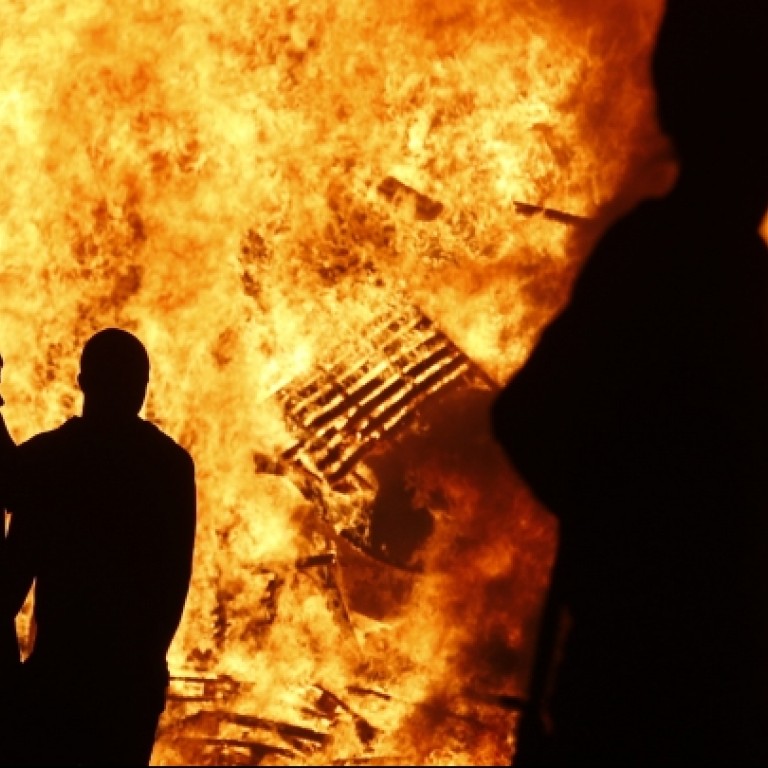
Northern Ireland braces for Protestant marches
Northern Ireland leaders appealed for calm and police braced for trouble in advance of Friday’s Protestant parades and bonfires on “the Twelfth,” an annual sectarian holiday that always inflames tensions with the Catholic minority.
The police commander, Chief Constable Matt Baggott, took the unusual step of importing 630 police officers from England and Scotland to beef up his own 7,000-member force. The officers have already received Northern Ireland-specific riot training as part of their initial deployment to the British territory last month to provide security for the Group of Eight summit of world leaders.
Baggott said the reinforcements would be needed to help deter trouble Friday when the major British Protestant brotherhood, the Orange Order, mounts 550 parades in commemoration of a 17th century military victory over Irish Catholics. He said 43 parades, an unusually high number, would pass near potentially hostile Catholic areas.
Britain’s Cabinet minister for Northern Ireland, Theresa Villiers, and the justice minister of Northern Ireland’s unity government, David Ford, on Thursday met some of the officers tasked with keeping order on July 12, the most hallowed date on the Orange calendar. They both said police were confident of containing any street clashes and keeping extremists from both sides apart.
For more than two centuries, Orangemen have marched to commemorate July 12, 1690, when forces loyal to William of Orange, the newly crowned Protestant king of England, routed the army of the deposed Catholic king, James II, in a river valley south of Belfast. Orangemen march beneath banners portraying the British crown atop an open Bible and proclaim William as defender of their civil and religious liberty on what was then, and now, a mostly Catholic island.
Most Catholics loathe the marches as a Protestant effort to intimidate and insult them, a view underscored by the Orangemen’s accompaniment on parade by so-called kick the pope bands of fife and drum playing a mixture of Gospel and sectarian tunes.
“People have a choice to make tomorrow. Violence is in no way inevitable,” said Assistant Chief Constable Will Kerr, who is overseeing police operations in Belfast, where violence has followed the Twelfth parades every year since 2009.
Tensions rose before the traditional midnight start to the Protestant festivities: the lighting of towering bonfires decorated provocatively with Irish and Catholic symbols. Firefighters must contend with the toppling of recklessly tall bonfires on to nearby homes and also withstand assaults from the often-drunken mobs gathered near the fires.
A British government-appointed panel called the Parades Commission since 1997 has imposed restrictions on the path of Orange parades to keep conflict with Catholics to a minimum, but the effort faces no-win situations in the tight sectarian geography of Belfast, with its patchwork of Catholic and Protestant districts. Most trouble occurs when the Orangemen march from their central rallying point, a farm field south of the capital, back to their lodges in smaller evening parades on most major Belfast roads.
For the past four years, Irish republican extremists have clashed with police after Orangemen passed near Ardoyne, a traditional power base for the outlawed Irish Republican Army in north Belfast. The clashes typically have persisted for two or three nights and involved the burning of hijacked vehicles, the hurling of homemade grenades and bursts of gunfire from IRA members. More than 250 police officers have been injured in Twelfth-related Ardoyne violence since 2009.
The recurring violence has demonstrated how IRA splinter groups remain rooted in places like Ardoyne despite the 2005 decision of most IRA members to disarm and officially abandon their 1970-1997 campaign to force Northern Ireland out of the United Kingdom.
This year for the first time, the Parades Commission has ordered Orangemen to avoid the main road near Ardoyne. But the Orangemen have no logical alternative route to reach their lodge in a nearby district called Ligoniel, and Protestants are threatening to stand their ground until police let them through.
Orange leaders rebuffed concerns that their plan for late-night standoffs with police was a recipe for Protestant rioting that could easily spiral out of control.
“The Parades Commission has created this crisis,” said the Orange Order’s chaplain, Mervyn Gibson. He said the police’s decision to deploy extra officers from Britain “shows that the police are worried about the whole situation and that’s because of the Parades Commission’s crazy decision.”

